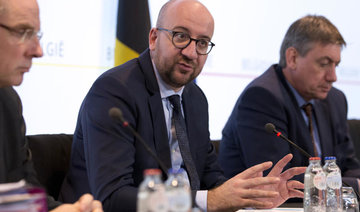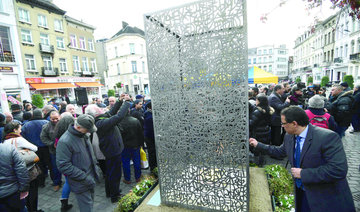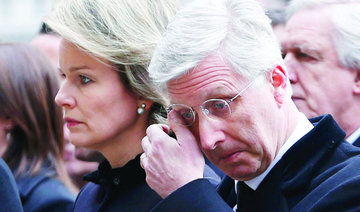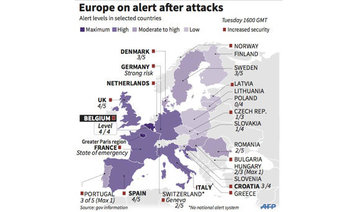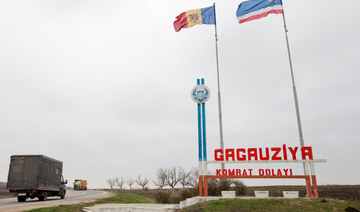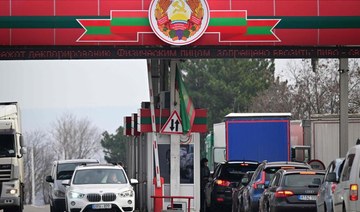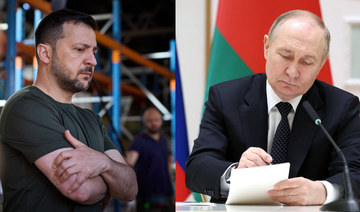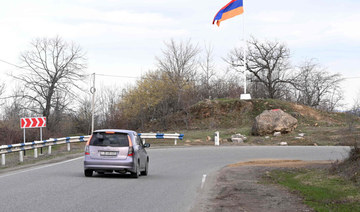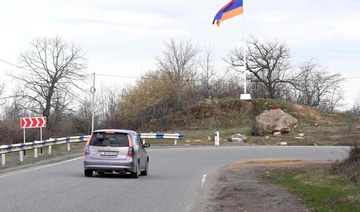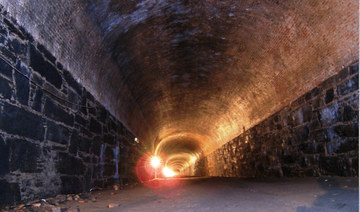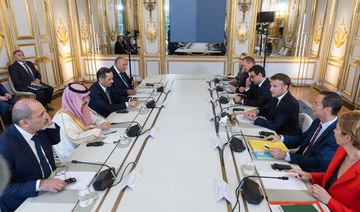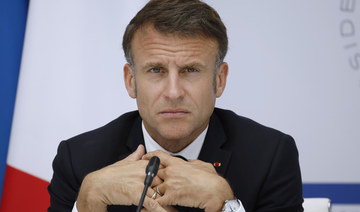BRUSSELS: Belgium observed a moment of silence on Wednesday to mark the first anniversary of the Daesh bombings in Brussels, beginning a day of emotional ceremonies designed to show that the heart of Europe stands defiant.
A somber King Philippe and Queen Mathilde, along with Belgian Prime Minister Charles Michel and other ministers, lined up quietly at 7:58 a.m. outside the renovated Zaventem Airport to mark the exact time when two suicide bombers killed 16 people and wounded many more at the site.
During the airport ceremony, a woman clutched white roses as Eddy Van Calster, the brother of airport check-in agent Fabienne Van Steenkiste, who was killed in the attack, played a rock ballad in tribute.
As hundreds of people including victims’ family members and rescue workers looked on, an airport official read out the names of all of the victims. “March 22 2016, will forever be in our hearts...we stand here united,” the official said.
The royals will lead a second moment of silence at 9:11 a.m. at Maalbeek subway station to mark the moment a third suicide bomber killed another 16 people on a crowded train.
More than 320 people were wounded in both attacks.
In an act of defiance and solidarity, the event at Maalbeek is due to be followed by applause and a “minute of noise” as trains, trams and buses come to a halt in memory of the victims of the country’s worst ever terror attacks.
The king and queen will inaugurate a new steel memorial at the heart of the EU institutions based in Brussels.
A year on, Belgium remains on high alert with troops patrolling the streets and warnings of fresh risks from Daesh terrorists returning home from Iraq and Syria.
Investigators say the blasts were carried out by a network that was also behind the November 2015 Paris attacks, in which 130 people were killed, and acted on orders from the Daesh high command.
Ibrahim El-Bakraoui and Najim Laachraoui struck at the airport while El-Bakraoui’s brother exploded his bomb at the metro station.
While tightly guarded, Wednesday’s ceremonies focus on bringing Belgian society together, from royalty to schoolchildren, and from people of all faiths.
“Today we remember the victims of the attacks. We all remain united,” Michel tweeted.
During the “minute of noise,” commuters will be invited to take part “to show that they do not forget but they will stay standing against hate and terror,” said the Brussels public transport company Stib.
Later, children from schools in Molenbeek, the largely Muslim area where many of the attackers hailed from, will meet victims of the attacks in a show of solidarity.
Three marches by Brussels residents will then meet at the Place de La Bourse which was transformed into an impromptu, flower-strewn memorial after the attacks last year.
Finally Brussels’ most famous landmark — the Manneken Pis statue of a little boy — will be dressed up in a fireman’s outfit to hail the efforts of rescue services.
“Over the years Manneken Pis has been stolen, dismounted and broken into pieces. But he is still there and is for us a witness of resistance and dignity,” said Tanguy du Bus de Warnaffe, the head of the Brussels fire service.
The shock of the attacks was compounded by accusations afterwards that Belgium had become a “failed state” which was unable to track down the cell behind the Brussels bombings and also the Paris attacks in which 130 people died.
Victims and their families have also complained about the difficulties of getting compensation from Belgian authorities.
Questions abounded about whether deep divisions between Belgium’s French and Flemish speaking communities had allowed growing radicalism to slip under the radar.
Fugitive Paris attacker Salah Abdeslam was shot and arrested in a police raid in Molenbeek on March 18, 2016, raising speculation about how he had managed to return to Belgium and remain undetected for nearly four months.
His arrest apparently panicked the rest of the cell into changing their plans and, instead of carrying out a new attack on France, they targeted the airport and metro in Brussels just four days later, investigators say.
A third airport attacker whose device failed to go off, Mohamed Abrini, was arrested in Brussels nearly a month after the attacks.
Belgium falls silent one year after Brussels attacks
Belgium falls silent one year after Brussels attacks
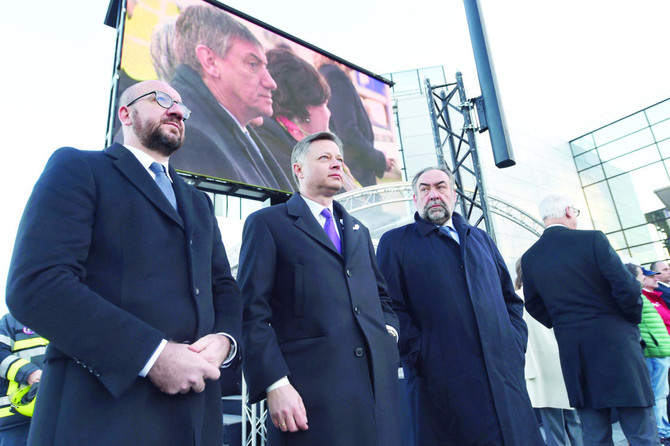
Twelve Moldovan parties clinch pro-Europe pact, but not all back president
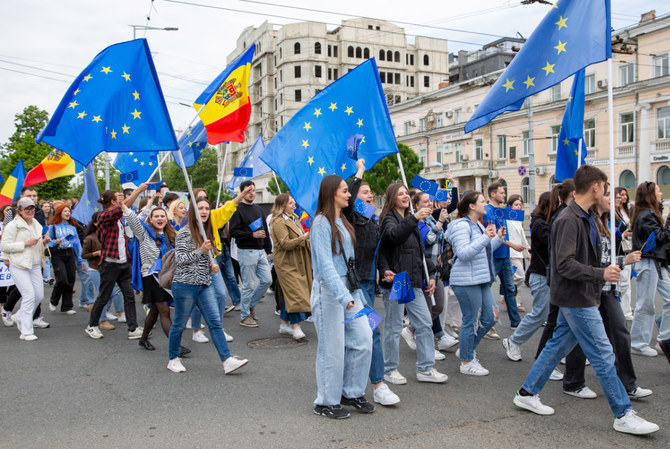
- Sunday’s accord was signed by Sandu’s Party of Action and Solidarity (PAS), which holds a majority in parliament in one of Europe’s poorest countries, lying between Ukraine and Romania
CHISINAU: Twelve parties in Moldova clinched a pact on Sunday committing them to act in favor of European Union membership for the ex-Soviet state as the campaign for an October referendum on European integration heats up.
But not all the parties support pro-European President Maia Sandu, who is running for re-election in a poll taking place alongside the referendum. Some of them intend to put up a joint candidate to run against her.
The Oct. 20 referendum pits Sandu and pro-European forces against a group of disparate pro-Russian parties which are already holding rallies with the slogan “No to the EU.”
Sunday’s accord was signed by Sandu’s Party of Action and Solidarity (PAS), which holds a majority in parliament in one of Europe’s poorest countries, lying between Ukraine and Romania.
But the pact’s initiators, four parties jointly dubbed “Together,” accuse Sandu of “privatizing” European integration by relying solely on her PAS party.
The group, which polls show could secure enough votes to win seats in parliament, call on Sandu to dismiss her government and bring other pro-European parties into the administration.
With pro-Russian parties running an organized “no” drive in the referendum campaign, analysts say the key is to muster support for EU integration in the plebiscite without devoting too much attention to Sandu’s chances of re-election.
“Voters must remember that on October 20, defeat in the referendum will mean defeat for Moldova, casting it into the past,” Vitalii Andrievschii, Director of the Institute for Effective Policy, told Reuters.
“The referendum on EU membership and the presidential election are different things. Maia Sandu should not be viewed in association with the referendum.”
Sandu says Russia and corruption are the biggest threats to Moldova and she places EU membership at the center of her policies.
Openly opposed to a “yes” vote is the pro-Russian “Victory” bloc headed by fugitive business magnate Ilan Shor, sentenced in absentia to 15 years in prison in connection with the 2014 disappearance of $1 billion from the Moldovan banking system.
The opposition Socialists and Communists, also friendly to Moscow, say they support European integration but oppose the referendum as a means to secure the president’s re-election. But they show no inclination to cooperate with the “Victory” bloc.
Putin arrives in Uzbekistan on his 3rd foreign trip since re-election
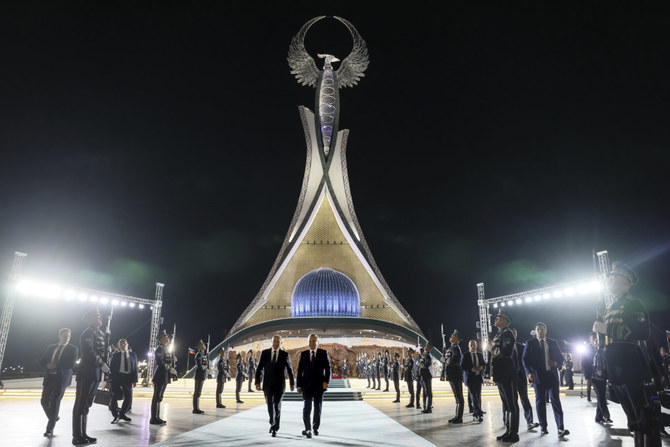
- The Kremlin leader has traveled abroad only infrequently since the start of Moscow’s invasion of Ukraine in February 2022
MOSCOW: Russian President Vladimir Putin arrived Sunday in the capital of Uzbekistan where he is to hold talks with President Shavkay Mirziyoyev that are expected to focus on deepening the countries’ relations.
Putin laid a wreath at a momument to Uzbekistan’s independence in Tashkent and held what the Kremlin said were informal talks with Mirziyoyev. The formal meeting of the presidents is to take place Monday.
Kremlin spokesman Dmitry Peskov, quoted by news agencies, told Russian television that Russia was open to broader cooperation on gas supplies with Uzbekistan, saying “the possibilities here are very extensive.”
The visit is Putin’s third foreign trip since being inaugurated for a fifth term in May. He first went to China, where he expressed appreciation for China’s proposals for talks to end the Ukraine conflict, and later to Belarus where Russia has deployed tactical nuclear weapons.
Ahead of the Uzbekistan trip, Putin and Mirziyoyev discussed an array of bilateral cooperation issues, including trade and economic relations, the Kremlin said.
The Kremlin leader has traveled abroad only infrequently since the start of Moscow’s invasion of Ukraine in February 2022.
The International Criminal Court issued a warrant for his arrest last March on suspicion of illegally deporting hundreds of children from Ukraine. The Kremlin denies those allegations.
Armenians throng center of the capital to demand the prime minister’s resignation
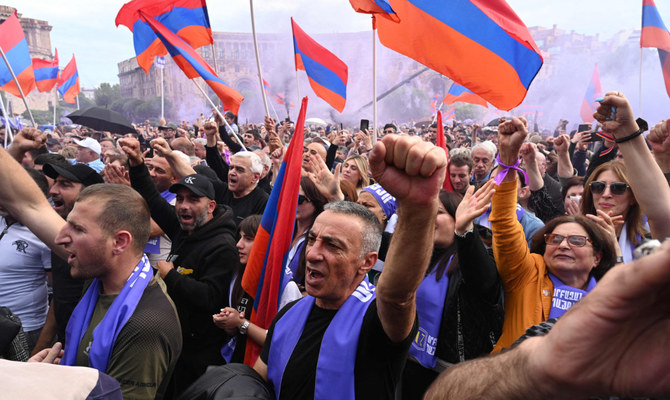
- Movement leaders told the rally Sunday that they support Galstanyan becoming the next prime minister
YEREVAN, Armenia: Tens of thousands of demonstrators held a protest Sunday in the center of the capital of Armenia, calling for the resignation of Prime Minister Nikol Pashinyan after Armenia agreed to hand over control of several border villages to Azerbaijan.
The demonstration was the latest in a weekslong series of gatherings led by a high-ranking cleric in the Armenian Apostolic Church, Bagrat Galstanyan, archbishop of the Tavush diocese in Armenia’s northeast.
He spearheaded the formation of a movement called Tavush For The Homeland after Armenia in April agreed to cede control of four villages in the region to Azerbaijan. Although the villages were the movement’s core issue, it has expanded to express a wide array of complaints about Pashinyan and his government.
Movement leaders told the rally Sunday that they support Galstanyan becoming the next prime minister.
The decision to turn over the villages in Tavush followed the lightning military campaign in September in which Azerbaijan’s military forced ethnic Armenian separatist authorities in the Karabakh region to capitulate.
After Azerbaijan took full control of Karabakh, about 120,000 people fled the region, almost all of its ethnic Armenian population.
Ethnic Armenian fighters backed by Armenian forces had taken control of Karabakh in 1994 at the end of a six-year war. Azerbaijan regained some of the territory in fighting in 2020 that ended in an armistice that brought in a Russian peacekeeper force, which began withdrawing this year.
Pashinyan has said Armenia needs to quickly define the border with Azerbaijan to avoid a new round of hostilities.
Man accused in fiery liquid attacks on New York City subway riders
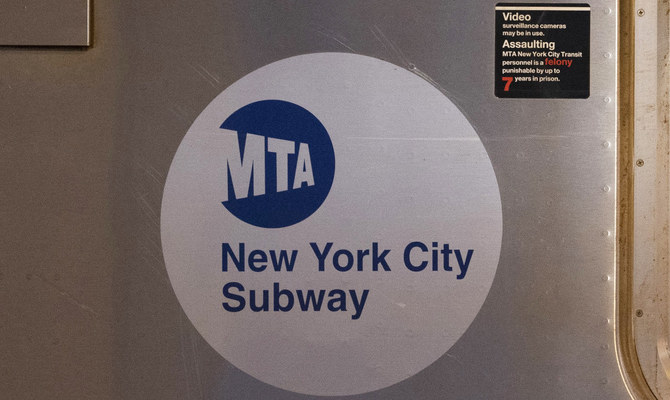
- While violent crime is rare in the city’s subway system, which serves about 3 million riders a day, some high-profile attacks this year have left some riders on edge
NEW YORK: A man set a cup of liquid on fire and tossed it at a fellow subway rider in New York City, setting the victim’s shirt ablaze and injuring him, police said Sunday.
The random attack happened on a No. 1 train in lower Manhattan on Saturday afternoon, city police said, adding that the suspect was in custody on an array of criminal charges. Authorities also charged the man in connection with a similar fiery assault on the subway in February.
The victim from Saturday, a 23-year-old man, was recovering at a hospital. He told the New York Post that he shielded his fiancee and cousin from the burning liquid and his shirt caught on fire. He said he slapped himself to put out the flames. Doctors told him he had burns on about a third of his body, he said.
“He had a cup,” the victim told the Post. “He made fire and he threw it all.”
While violent crime is rare in the city’s subway system, which serves about 3 million riders a day, some high-profile attacks this year have left some riders on edge. They include the death of a man who was shoved onto the tracks in East Harlem in March and a few shootings.
The suspect in Saturday’s assault, Nile Taylor, 49, was arrested a short time after it happened when police tracked a phone he allegedly stole from another subway rider to his location, authorities said. He was charged with assault, arson, illegal possession of a weapon and several other crimes.
It wasn’t immediately clear if Taylor had a lawyer who could respond to the allegations, or when he would be arraigned in court.
Authorities also announced on Sunday afternoon that Taylor was charged with attempted assault, reckless endangerment and arson in the February attack. Police say he threw a container with a flaming liquid at a group of people on a subway platform in the West 28th Street station. No one was injured.
Gov. Kathy Hochul in March announced that hundreds of National Guard members would be going into the subway system to boost security. City police said 800 more officers would be deployed to the subway to crack down on fare evasion.
Macron urges defense of democracy on state visit to Germany
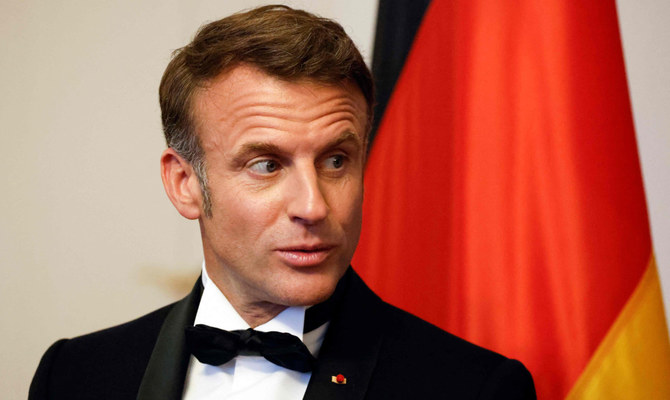
- Macron made his first stop a democracy festival in Berlin, where he warned of a “form of fascination for authoritarianism which is growing” in the two major EU nations
BERLIN: Emmanuel Macron began Sunday the first state visit to Germany by a French president in a quarter-century, bringing a plea to defend democracy against nationalism at coming European Parliament elections.
Macron made his first stop a democracy festival in Berlin, where he warned of a “form of fascination for authoritarianism which is growing” in the two major EU nations.
“We forget too often that it’s a fight” to protect democracy, Macron said, accompanied by German President Frank-Walter Steinmeier.
If nationalist parties had been in power in Europe in recent years, “history would not have been the same,” he said, pointing to decisions on the coronavirus pandemic or Russia’s invasion of Ukraine.
Steinmeier said: “We need an alliance of democrats in Europe.”
Macron “has rightly pointed out that the conditions today before the European elections are different from the previous election, a lot has happened,” he added.
The trip comes two weeks ahead of European Union elections in which polls are indicating a major potential embarrassment for Macron, with his centrist coalition trailing behind the far right.
It could even struggle to reach a third-place finish.
In Germany too, all three parties in Chancellor Olaf Scholz’s coalition are polling behind the far-right AfD in surveys, despite a series of scandals embroiling the anti-immigration party.
At a press conference, Macron said he would work to “unmask” France’s far-right National Rally (RN), saying that “nothing in their rhetoric holds water.”
“Unlike many, I’m not getting used to the idea that the National Rally is just another party. And so when it’s at the top of the surveys, I see this party and its ideas as a threat to Europe,” he said.
In a keynote address on foreign policy last month, Macron warned about the threats to Europe in the wake of Russia’s 2022 invasion of Ukraine.
“Our Europe, today, is mortal and it can die,” he said. “It can die, and this depends only on our choices.”
Ramping up his warning in Berlin, Macron urged Europeans “to go vote for the party that we back and a party that defends Europe.”
Hosting a state banquet later Sunday for Macron, Steinmeier also referred to the threat posed by Russia.
“Together we must learn again to better protect ourselves against aggressors, and to make our societies more resilient against attacks from within and without,” he said.
After the talks with Steinmeier, Macron is due to bring his message to Dresden in the former East German state of Saxony, where the AfD has a strong support base.
On Tuesday, Macron will visit the western German city of Munster and later Meseberg, outside Berlin, for talks with Scholz and a joint Franco-German cabinet meeting.
Beyond making joint appeals for the European elections, Macron’s three-day visit will seek to emphasize the historic importance of the postwar relationship between the key EU states.
France next month commemorates 80 years since the D-Day landings that marked the beginning of the end of Nazi Germany’s World War II occupation.
But all has not been smooth in a relationship often seen as the engine of the EU, and German officials are said to be uneasy at times about Macron’s perceived theatrical style of foreign policy.
Macron’s refusal to rule out sending troops to Ukraine sparked an unusually acidic response from Scholz that Germany had no such plans. Germany also does not share Macron’s enthusiasm for a European strategic autonomy less dependent on the United States.
But Macron sought to dismiss talk about discord, saying that coordination with Germany had been key over the years.
He cited agreements on sanctions against Russia over its war on Ukraine and action to spur European economic growth and innovation after the Covid pandemic.
“The Franco-German relationship is about disagreeing and trying to find ways of compromise,” said Helene Miard-Delacroix, specialist in German history at the Sorbonne university in Paris.
While Macron is a frequent visitor to Berlin, the trip is the first state visit in 24 years, since a trip by Jacques Chirac in 2000, and the sixth since the first postwar state visit by Charles de Gaulle in 1962.


